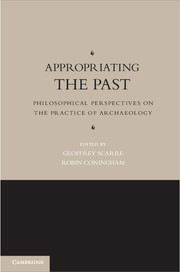Book contents
- Frontmatter
- Contents
- Contributors
- Editors
- Chapter 1 Introduction
- Part One Claiming the Past
- Part Two Problems of Meaning and Method
- Chapter 8 What Is a Crisis of Intelligibility?
- Chapter 9 Contesting Religious Claims over Archaeological Sites
- Chapter 10 Multivocality and “Wikiality”
- Chapter 11 “Do not do unto others…”
- Chapter 12 Should Ruins Be Preserved?
- Part Three Problems of Ownership and Control
- References
- Index
Chapter 9 - Contesting Religious Claims over Archaeological Sites
Published online by Cambridge University Press: 05 December 2012
- Frontmatter
- Contents
- Contributors
- Editors
- Chapter 1 Introduction
- Part One Claiming the Past
- Part Two Problems of Meaning and Method
- Chapter 8 What Is a Crisis of Intelligibility?
- Chapter 9 Contesting Religious Claims over Archaeological Sites
- Chapter 10 Multivocality and “Wikiality”
- Chapter 11 “Do not do unto others…”
- Chapter 12 Should Ruins Be Preserved?
- Part Three Problems of Ownership and Control
- References
- Index
Summary
Contests over heritage may come from multiple perspectives or values. In this chapter I explore contested claims over heritage and archaeological sites that are made on the basis of religion. These claims may compete with archaeological interests because they are backed by a human right, the right of religious freedom, and because the concept of the sacred is accompanied by the concept of taboo. However, in determining which groups have the strongest claims, judgments are informed by a distinction between those religions that are perceived as traditional and as having a requisite historical connection with an archaeological site, and those religious beliefs that are considered to be invented, or reinvented, traditions. The concept of authenticity informs decisions in such cases but creates numerous inequities in our treatment of religious groups.
My focus is on claims that are made over specific archaeological or geographical sites. What is distinct about these claims is their focus on what might be termed place. It is widely recognized that such claims over specific sites occur in a context of identity politics in a manner that connects people with land. For groups such as First Nation peoples and Aboriginal and Torres Strait Islanders, the concept of place is central to the religion. Creators and ancestors are associated with specific areas of land, and the land reflects the immanence of these creators and ancestors. Because of this, religious practice is site specific. Although in the Abrahamic traditions a place may become sacred, such as occurs with historical sites or miraculous events, the central site of worship is sanctified through ritual, such as when a church is consecrated. This implies flexibility about where worship is conducted.
- Type
- Chapter
- Information
- Appropriating the PastPhilosophical Perspectives on the Practice of Archaeology, pp. 156 - 175Publisher: Cambridge University PressPrint publication year: 2012
- 2
- Cited by

